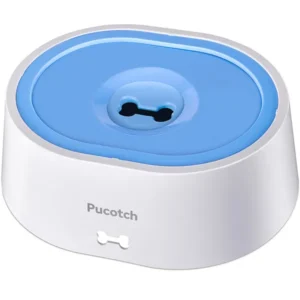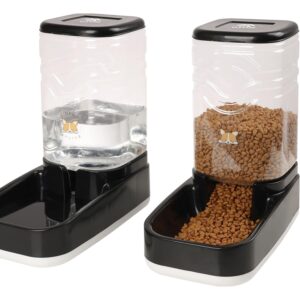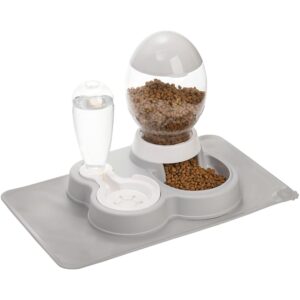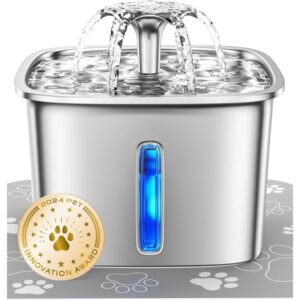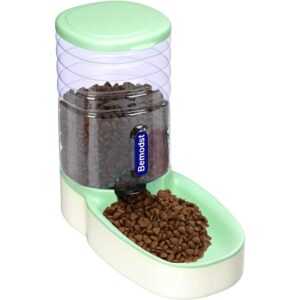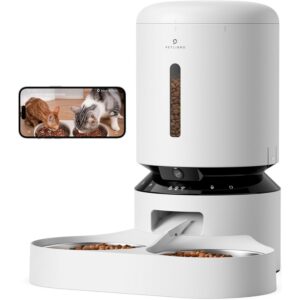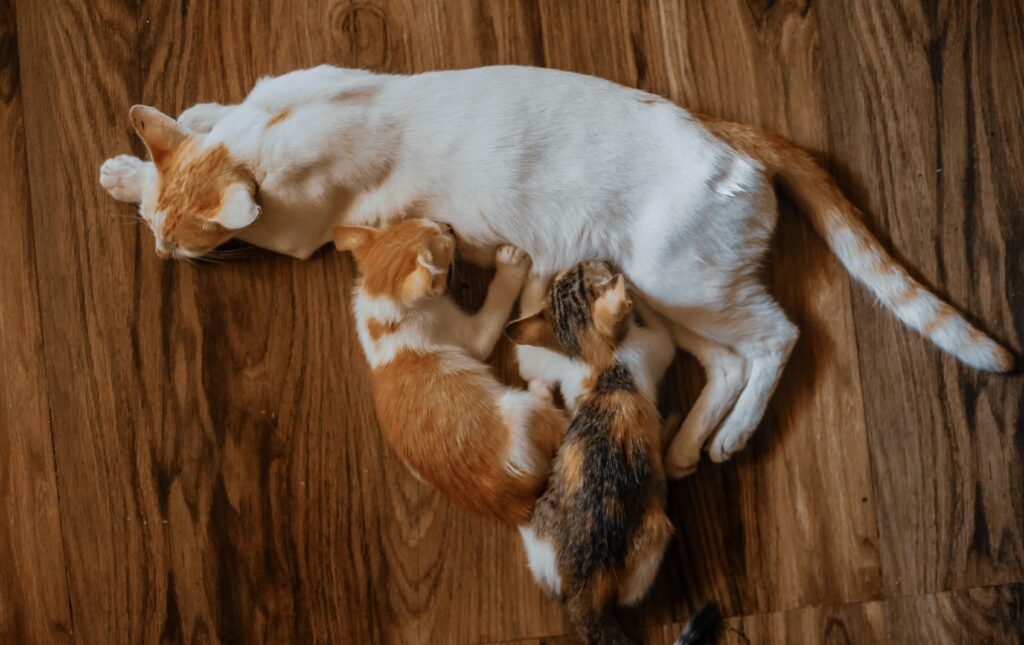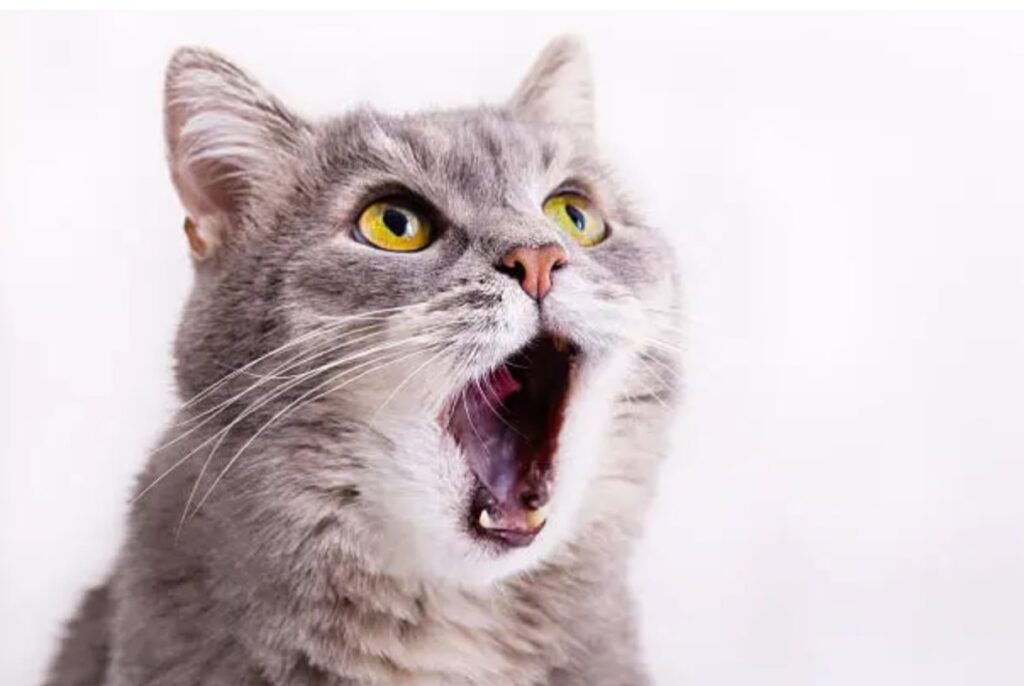New Arrivals
-
Pucotch Dog Water Bowl No Spill 2L/70oz Spill Proof Slow Water Feeder for Dogs No Splash Pet Water Bowl Dispenser for Messy Drinkers Vehicle BPA Free
Original price was: $25.89.$16.84Current price is: $16.84. Buy now -
Cat Water Dispenser and Feeding Bowl 2-in-1 , Dry and Wet Separation Automatic Water Dispenser with Flow Design, Sturdy, Easy-to-Clean
Original price was: $39.89.$19.99Current price is: $19.99. Buy now -
Meikuler Pets Auto Feeder 3.8L, Food Feeder and Water Dispenser Set for Small & Big Dogs Cats and Pets Animals (Green)
Original price was: $29.93.$15.48Current price is: $15.48. Buy now -
PETLIBRO Upgraded RFID Automatic Cat Feeder, 5G Wi-Fi Automatic Pet Feeder, 3L Auto Cat Feeder App Control with Light Collar Tag, Tag Activated One Automatic Cat Food Dispenser 1-10 Meals Control
Original price was: $149.99.$89.75Current price is: $89.75. Buy now -
PETLIBRO Automatic Cat Feeder Wet Food Refrigerated New Upgraded APP Control,3 Days Freshness 3 Meals,Semiconductor Cooling&Quick Chills Wet Food Dispenser,Polar WiFi Timed Auto Pet Feeder for Cat Dog
Original price was: $129.99.$70.84Current price is: $70.84. Buy now -
Elevon Automatic Cat Feeder, Gravity Food and Water Dispenser Bowl Set for Small Medium Dogs Animals, Pet Feeder Dispenser Storage Food, 3.8L Large Capacity, Black
Original price was: $35.98.$18.88Current price is: $18.88. Buy now -
Casfuy Automatic Cat Feeder Cordless – Automatic Cat Food Dispenser for Wet Moist Food with 4 Ice Packs Rechargeable Auto Feeder for Cats Small Dogs with Programmable Timer Low Battery Indicator
Original price was: $89.99.$55.87Current price is: $55.87. Buy now -
YOUEON Automatic Cat Feeder and Water Dispenser Set, 2 in 1 Gravity Pet Feeder and Waterer with Pet Food Mat, Cat Food and Water Bowl Set for Cats and Small Dogs Puppy, Grey
Original price was: $21.99.$13.76Current price is: $13.76. Buy now -
IMIPAW Automatic Cat Feeder and Water Fountain, Timed Pet Dry Food Dispenser, Programmable Portion Control, 1-6 Meals Per Day, Cat Fountains for Drinking with Filter, Small Pets (3L Combo)
Original price was: $49.99.$31.87Current price is: $31.87. Buy now -
Automatic Cat Feeder, Programmable Feeding Schedule, Dual Power Supply, Large Capacity 3.5L Food Tank, Cactus-Looking Design, Easy to Clean, BPA Free, One Year Warranty
Original price was: $33.99.$19.99Current price is: $19.99. Buy now -
Veken Innovation Award Winner Stainless Steel Cat Water Fountain, 95oz/2.8L Automatic Pet Fountain Dog Water Dispenser with Replacement Filters & Silicone Mat for Cats, Dogs, Multiple Pets (Silver)
Original price was: $35.99.$22.87Current price is: $22.87. Buy now -
Cat Water Fountain: BMDSAE 88Oz Pet Water Fountains Indoor 24/7 Running Water Supplies Dispenser for Drinking Dish Automatic Dog Waterer Bowls Flow Ultra Quiet Pump Faucet Bottle Watering
Original price was: $25.99.$14.89Current price is: $14.89. Buy now -
Bemodst Automatic Pet Feeder, Cat Dog Gravity Feeder Bowl, 1 Gallon Cat Dog Food Dispenser, Suitable for Small and Medium-Sized Dogs and Cats (Green- Feeder)
Original price was: $18.99.$9.99Current price is: $9.99. Buy now -
Noa Store Automatic 1-Gallon Pet Feeder, Easy to Clean, Supports Multiple Pets, Ideal for Cats and Dogs
Original price was: $30.99.$15.89Current price is: $15.89. Buy now -
PETLIBRO Automatic Cat Feeder with Camera for Two Cats, 1080P HD Video with Night Vision, 5G WiFi Pet Feeder with Phone APP Control, 2-Way Audio for Cat & Dog, Low Food & Motion & Sound Alerts
Original price was: $119.99.$85.77Current price is: $85.77. Buy now

Cat Guidance
How Many Babies Do Cats Give Birth to at Once?
Cats are among the most popular pets in the world, loved for their independent personalities,…
Why Is My Cat Shedding So Much Hair? Causes, Tips & Solutions
Medicine: cat hair loss Introduction Cats are known for their beautiful, soft fur. But when…
What Happens When You Crossbreed a Bengal Cat?
The Bengal cat, with its wild leopard-like spots and high energy levels, is one of…
Can Cats Eat Human Food? A Complete Guide to Safe and Unsafe Foods
Introduction If you’re a cat parent, you’ve probably seen those pleading eyes whenever you’re eating…
Top 10 Reasons Why Cats Are the Best Pets – A Cat Lover’s Guide
Cats have captured human hearts for centuries. Whether you’re a long-time feline fan or considering…
Why Is My Cat Meowing So Much?
If your cat has been meowing excessively, you’re not alone. Many cat owners ask the…

Most Loved by the Customers
Automatic Cat Feeder
-
Pucotch Dog Water Bowl No Spill 2L/70oz Spill Proof Slow Water Feeder for Dogs No Splash Pet Water Bowl Dispenser for Messy Drinkers Vehicle BPA Free
Original price was: $25.89.$16.84Current price is: $16.84. Buy now -
Cat Water Dispenser and Feeding Bowl 2-in-1 , Dry and Wet Separation Automatic Water Dispenser with Flow Design, Sturdy, Easy-to-Clean
Original price was: $39.89.$19.99Current price is: $19.99. Buy now -
Meikuler Pets Auto Feeder 3.8L, Food Feeder and Water Dispenser Set for Small & Big Dogs Cats and Pets Animals (Green)
Original price was: $29.93.$15.48Current price is: $15.48. Buy now -
PETLIBRO Upgraded RFID Automatic Cat Feeder, 5G Wi-Fi Automatic Pet Feeder, 3L Auto Cat Feeder App Control with Light Collar Tag, Tag Activated One Automatic Cat Food Dispenser 1-10 Meals Control
Original price was: $149.99.$89.75Current price is: $89.75. Buy now -
PETLIBRO Automatic Cat Feeder Wet Food Refrigerated New Upgraded APP Control,3 Days Freshness 3 Meals,Semiconductor Cooling&Quick Chills Wet Food Dispenser,Polar WiFi Timed Auto Pet Feeder for Cat Dog
Original price was: $129.99.$70.84Current price is: $70.84. Buy now
What Our Customers Say
Meow Feeders has the best pet feeding solutions! Easy to use site, fast loading, and top-quality products for cats. Highly satisfied!
Amazing variety of cat feeders and accessories! The website is clean, fast, and shopping was super smooth. Love it!
Great experience! Meow Feeders offers reliable, modern feeders. My cat loves it, and I loved how easy the site was to navigate.
